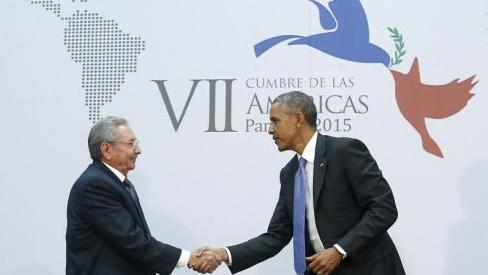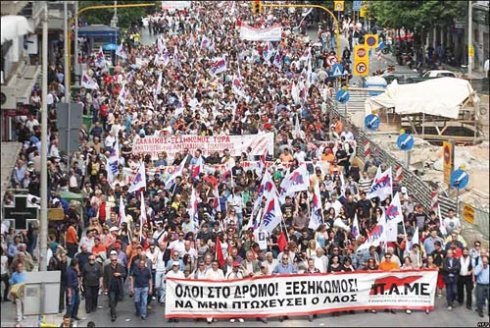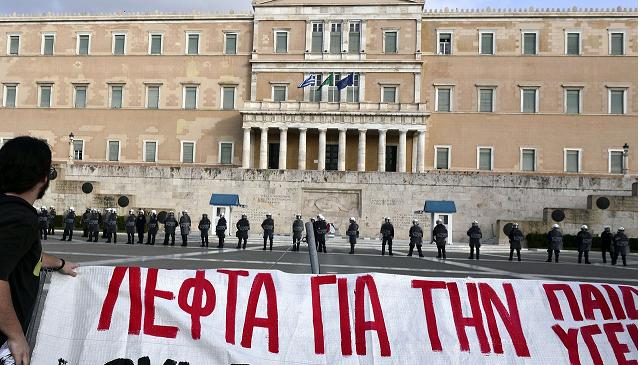Polemic
Why does the far left refuse to propose "the Socialist United States of Europe?"
04/11/2011
By Juan Chingo
In the middle of the historic crisis of capitalism at an international level, the different European bourgeoisies have led Europe to a new dead end. The bourgeois states are totally powerless, seeking to save themselves by themselves alone, and some, to the detriment of others. Their choices of a solution can only worsen the crisis, by increasing the frictions among the different nations that make up the European Union (EU).
Confronted with this reactionary road, as revolutionary Marxists, we must tell the workers out loud the only progressive solution, benefiting all the peoples that make up Europe: that only the working class will be able to effect a real integration and unification of Europe, that the Socialist United States of Europe are the only progressive solution, in front of the current stagnation and the catastrophe that is threatening us.
Especially, in the strongest imperialist countries, like Germany and France, big creditors of the countries of the Mediterranean periphery of the EU, we must openly fight against every semi-colonizing plan of our own bourgeoisies. "Down with the austerity plans for Greece, Portugal, etc.!" must be the war cry in countries like France and Germany, where their big banks and governments are imposing unfair conditions on these countries. Let us again take up the example of the Communist International (CI), facing the despicable Treaty of Versailles, whose reparations and debts, caused by the First World War, since they were not resolved in a progressive fashion, led to the Second World War. The CI said, "The Second and Two and a half Internationals are dedicated to supporting the radical wing of the bourgeoisie, that represents, above all, the interests of commercial and banking capital in their helpless struggle for the lifting of reparations. As in all problems, in this one also, they march with the bourgeoisie. The tasks of the Communist Parties and, in the first place, those of the victorious countries is, therefore, to explain to the masses that the Peace of Versailles throws all the burdens onto the shoulders of the proletariat, both in the victorious countries and in the defeated countries, and that the proletarians of all countries are its real victims.
On this basis, the Communist Parties, and, especially those of Germany and France, must carry out a joint struggle against the Treaty of Versailles.
The French Communist Party must struggle with all its strength against the imperialist tendencies of its own bourgeoisie, against their attempt to enrich themselves through the intensified exploitation of the German proletariat, against the occupation of the Ruhr basin, against the division of Germany, against French imperialism. Today it is not enough to fight in France against the so-called ’defense of the fatherland.’ It is necessary to fight against the Treaty of Versailles at every step.
The duty of the Communist Parties of Czechoslovakia, Poland and the rest of France’s vassal states, is to link the struggle against their own bourgeoisie and the struggle against French imperialism. It is necessary, through joint actions of the masses, to explain to the French and German proletariat, that the attempt to put the Versailles Treaty into practice, reduces the proletariat of the two countries and, with it, the proletariat of all Europe, to the most profound poverty" [1] (our emphasis). In turn, an attitude like the second, in opposition to the dictates of the Troika, and of their own government and bourgeoisie, could be adopted in countries like Greece, Portugal, and Ireland, those most advanced in a process of surrendering key attributes of their sovereignty, a new semi-colonization.
Regrettably, this perspective and propaganda agitation is absent in the proposals of the majority of the tendencies and partisans of the far left. In our party, the NPA, this is the case in the approaches of the Economic Working Group (GTE), as shown by the articles of Henri Wilno and Isaac Joshua, two of its members, in the Imprecor [publication] of July-August-September. According to Joshua, the three key points of the Emergency Program are: repudiation of a substantial part of the debt, the reform of the European Central Bank (ECB) to allow monetary financing of the public deficit, and a fiscal reform that collects more taxes from the rich and from profits [2]. As is obvious, the framework of the imperialist institutions, like the ECB, is accepted, but reformed in favor of the interests of the workers for a Keynesian solution, which is, however, totally utopian in the context of the current capitalist collapse. For his part, Wilno, who says he is vindicating Trotsky’s Transitional Program in his note, ends up by setting out a similar program. In this way, the program and transitional method that is enunciated, turns into the opposite: from a bridge between the current consciousness of the masses and their needs and the necessity of defeating capitalism and taking power, it becomes a utopian program, merely anti-neoliberal, neither anti-capitalist nor socialist, to reform the imperialist institutions in the framework of capitalism in putrefaction.
[1] "Resolution on the Treaty of Versailles," IV Congress of the Comintern
[2] Isaac Johsua, « Crise : l’heure de vérité »
Friday, November 4, 2011














